Archives
Do deciduous tree roots block drains in winter?
Following on from our previous post, Do tree roots grow in sewer pipes during winter, deciduous trees that shed their leaves during the autumn, generally follow a similar pattern in terms of root growth during winter. However, there are a few additional factors to consider.
Deciduous trees undergo physiological changes in preparation for winter. As the days shorten and temperatures drop, they enter a period of dormancy. During this dormancy phase, metabolic activity slows down, including root growth. Deciduous trees allocate their energy resources towards survival mechanisms and protecting themselves from the cold rather than active growth.
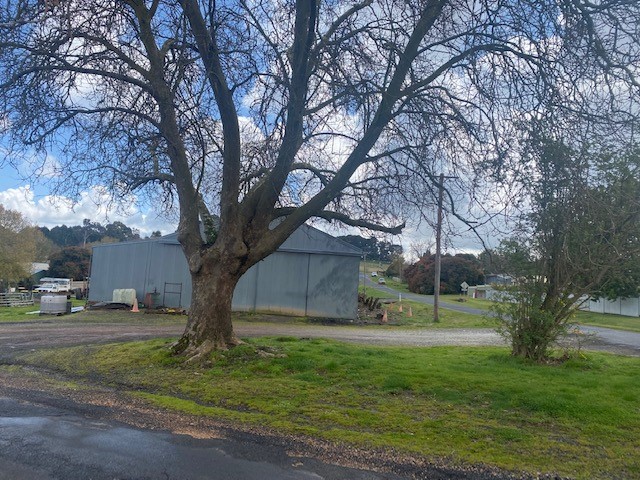
One significant difference with deciduous trees is that they shed their leaves in the autumn. This leaf drop allows the tree to conserve water and energy during winter when resources are limited. Without leaves, the tree doesn’t require as much water and nutrients, reducing the demand on the roots during the dormant period.
While root growth is generally slower or dormant during winter for deciduous trees, some root activity may still occur. Roots continue to function for basic water and nutrient uptake, albeit at a reduced rate compared to the active growing season. According to the arborists I’ve spoken with, the majority of root growth for deciduous trees resumes in the spring, coinciding with the growth of new leaves and the tree’s transition out of dormancy.
So, while there may be slight variations due to leaf drop and dormancy, the overall pattern of reduced root growth during winter applies to both deciduous and evergreen trees.
But remember, tree roots from deciduous trees will still block your drains and if they do, we can help!
Do tree roots grow in sewer pipes during winter?
As we transition into another Sydney winter, my thirst for knowledge about trees and their roots and how and why they grow in sewer pipes and whether they are as active as during the warmer months led me to here.
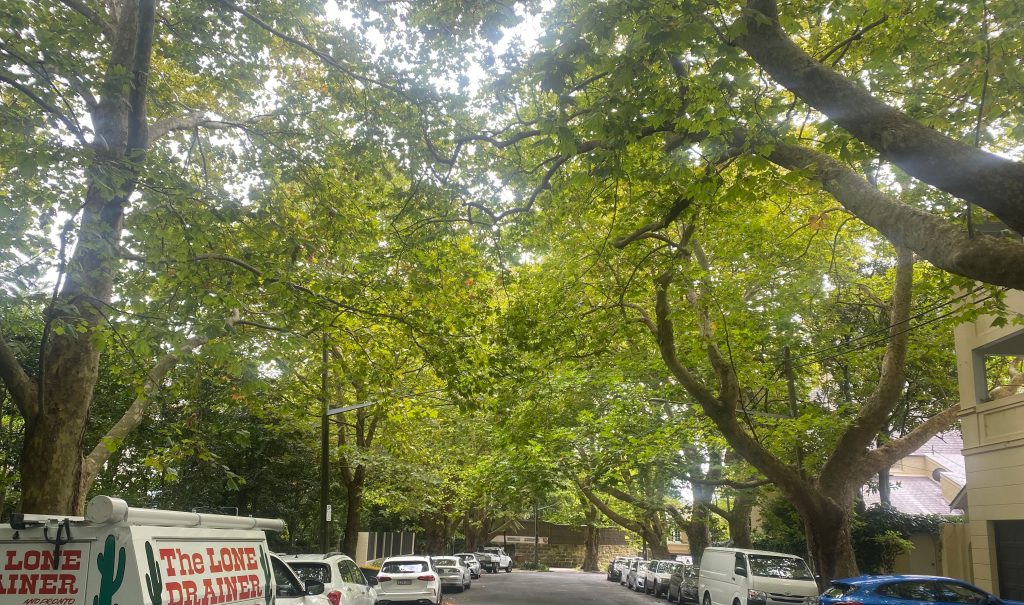
This magnificent display of London Plane trees in Woollahra was just starting to move into autumn mode and we were called to a blocked drain in the street. The blocked drain was caused by tree roots.
Tree roots generally grow more slowly or become dormant during the winter months. The growth of tree roots in drains is influenced by several factors, including temperature, soil conditions, and moisture availability. In colder climates, where winters are harsh and the ground freezes, root growth is typically limited or even halted.
During winter, the soil temperature drops, making it less favorable for root growth. Additionally, the availability of water is often reduced due to freezing or low precipitation levels. These conditions make it difficult for roots to actively grow and expand. Our seasons are changing but traditionally winter in Sydney is our dry season.
However, it’s important to note that tree roots can still function and absorb some nutrients from sewer pipes and drains during winter and continue to cause blockages albeit at a slower rate. They continue to provide support and anchorage for the tree, even if growth is minimal. I believe they are preparing for the spring while they’re hibernating.
And that’s why we still have to attend to tree root drain blockages during winter.
Root growth typically resumes in the spring when temperatures rise, and the soil becomes more conducive to growth. As the weather warms and soil conditions improve, tree roots become more active, allowing for increased growth and development.
Now if you live north of the NSW and Queensland border this theory would probably be tested because it doesn’t cool down as much as the southern states.
If you live in Australia’s sunny north and have a tale to tell about your blocked drains and tree roots, you can tell it here.
Are you buying a house on a tree lined street? Six things to consider!
If you have your eye on a house in a tree lined street, you should read this!
While street trees can have many benefits, there are also some potential negative impacts that should be considered.
- Damage to the street infrastructure: Street trees can cause damage to footpaths, roads, and buildings if their roots grow too close to or under them. They can also damage underground utilities such as electrical cables, water and gas pipes. The tree root systems will also cause blocked drains and sewer pipes. If you get a blocked drain you should call The Lone Drainer and Pronto.
- Maintenance: Street trees require regular maintenance, such as pruning and watering, to ensure they remain healthy and safe. This can be a significant cost for utility companies, municipalities and homeowners. Radical pruning is used to shape the street trees away from overhead electric power and communication lines.
- Allergies: Some people may have an allergic reaction to certain species of street trees, such as those that produce a lot of pollen.
- Invasive species: Some species of street trees can become invasive, meaning they can spread rapidly and compete with the native species. This can have a negative impact on local ecosystems and biodiversity.
- Canopy closure: Street trees can cause a canopy closure, blocking the sunlight and view, making the street darker and less attractive in the winter months. However, in our hot summer, the shade they provide brings a welcome relief from the heat of the day.
- Your car: Parking your car under a tree like this Hill’s Weeping Fig Ficus microcarpa hillii during certain seasons can be very messy. The fig has berries….. Lots of them. They attract possums, flying foxes and birds that feast on the berries and subsequently make a BIG mess on your car.
It’s important to consider these potential negative impacts when selecting, planting, and maintaining street trees. Proper tree selection, planning, and management can help to minimize these negative impacts and maximize the benefits of street trees.
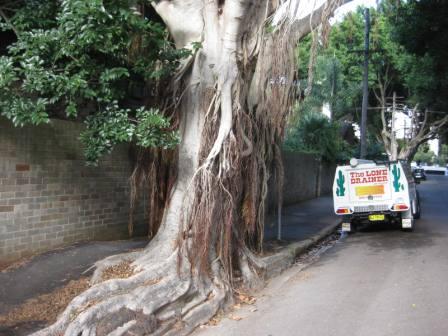
Five ways street trees affect your home!
If you’re considering buying a home in a tree lined street like this, you need to know how trees can affect houses on the street. Here’s just a few,
-
Property value: Street trees can have a positive impact on property values. Studies have shown that houses with street trees have a higher market value than houses without street trees.
-
Energy efficiency: Street trees can help to reduce energy costs by providing shade and reducing the amount of heat absorbed by houses. This can help to keep houses cooler in the summer and reduce the need for air conditioning.
-
Aesthetics: Street trees can enhance the appearance of a street and contribute to a more pleasant and inviting neighborhood.
-
Environmental benefits: Street trees can help to improve air and water quality, reduce storm water runoff, and provide habitat for wildlife.
- Some species can grow too large and cause damage to the roads, footpaths and sewers and storm water drains of houses or businesses on the street.
It’s important to note that while street trees have many benefits, they also require maintenance and care to ensure they are healthy and safe.
In Sydney Australia, local Councils as the owners, are responsible for maintaining the street trees on their property, including pruning, watering and removing dead branches or fallen leaves, and the maintenance of the blocked drains they cause.
It’s important they select the right species of tree for the location and space available, as some species can grow too large and cause damage to the roads, footpaths and sewers and storm water drains of houses or businesses on the street.
Read our previous posts about street trees and how blocked drains are managed by Randwick Council, Waverley Council and Woollahra Council here.
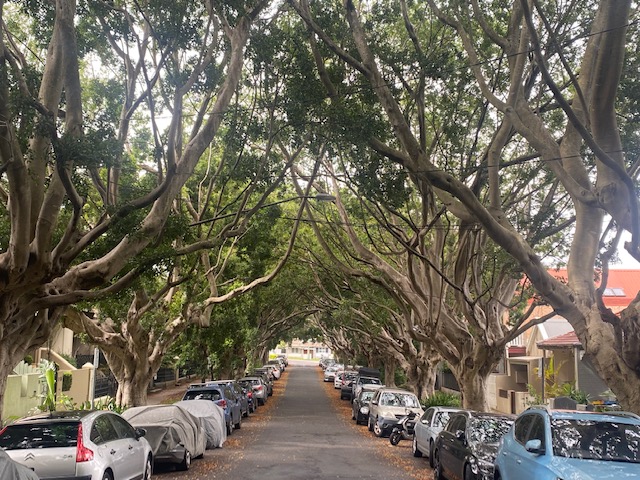
Stop tree roots in drains Kingsford
G’day, I’m Dave Conroy from The Lone Drainer and Pronto and Vaporooter Australia.
We’re at a property in Kingsford in Sydney. That’s Kingsford in the Randwick and Kensington area.
The property has had tree roots growing in the sewer and blocking the pipes.
For the last five years we have been treating the sewer pipes with Vaporooter with great results and they have had No Root blockages.
Our clients know if they had a root blockage, under the Vaporooter Guarantee we would clear their blockage free of any charges.
It’s a very good Guarantee!
They have a leafy garden with a Chinese elm tree, two Jacaranda trees and even though we have had a lot of rain in Sydney, the tree roots like the nutrient rich sewer water!
If tree roots are causing blockages in your sewer pipes, and you’re considering excavating and renewing your pipes
Or the pipe relining process,
It’s easy to call us to find out if Vaporooter is right for you.
The Lone Drainer and Pronto in Sydney on 02 9664 4990
Or
Vaporooter Australia on 1800 637 600
Tree roots never sleep
Coogee 2034 Sydney, Australia
G’day Sydney
We’re back at work in January 2022!
Our workload didn’t really let up over the Christmas and New Year period because tree roots just keep growing in pipes.
If you are having the same problem with roots in your drains and you are looking for a short-term or long-term solution call me on 1800 637 600
Or check out our site VaporooterAustralia.com.au
There may be a cost-effective solution there for you!
How to Stop a Blocked drain in Coogee
Vaporooter Stops Tree roots in Drains
Hi, It’s Dave Conroy here from The Lone Drainer and Pronto.
I am in Coogee today and we are applying Vaporooter to a house in this tree- lined street. The people who own this house have had problems with their sewer.
Tree roots from this Hills weeping fig (ficus microcarpa) have been growing in their clay sewer pipes for over 10 years and we had been clearing blockages regularly.
We have been applying Vaporooter in those same pipes now for about four years and they haven’t had a blocked drain since. Those are great results!
If you live in a street similar to this, where there is a beautiful canopy above but underground, the tree roots are getting into your sewer pipes, then you should consider Vaporooter to Stop tree roots in your drains.
If you would like to find out about Vaporooter, call me on Sydney 02 9664 4990.
World Plumbing Day 2021
Today is the 11th of March 2021 and it’s World Plumbing Day!
I just wanted to remind you that twelve months ago today, which was also World Plumbing Day, that we had a pandemic declared in Australia. While we’ve all had our lives changed over the last twelve months, the trees that you can see around me here are still growing in the drains in this house.
We have come back for our annual application of Vaporooter to STOP tree roots growing in the sewer pipes of this beautiful home.
Enjoy World Plumbing Day. Thank your local plumber, enjoy his company. Make him a cup of tea or coffee.

Woollahra Council trees are blocking my drains
Many of the blocked drains we attend to are caused by the trees that line the streets managed by Woollahra Council.
At street level, the trees’ canopy brings summer shade and all kinds of birdlife.
Contrary to belief, tree roots don’t go in search of water. They are stimulated as moisture levels, and the surrounding soil temperature reaches a point that is appealing to them.
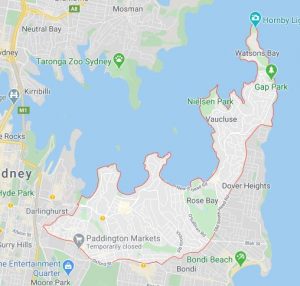
Sydney suburbs managed by Woollahra Council: Bellevue Hill, Darling Point, Double Bay, Edgecliff, Paddington, Point Piper, Rose Bay, Vaucluse
In most circumstances, the tree roots enter through leaking pipe joints and damage the sewer drains and stormwater pipes that take wastewater off your property. Many homeowners hold Woollahra Council responsible for their blockage and expect they will clear their blocked drains for free because the Council own the trees.
Well, in some cases they do!
But, Woollahra Council gets their income from you the ratepayer, and as you would expect, they have guidelines for spending ratepayers money to fix your blocked drains.
If you live in one of the suburbs managed by Woollahra Council, click here to see the Woollahra Council Wastewater Policy.
The top points are that you the homeowner:
Must have a sewer service diagram for your home.
Must maintain your sewer pipes.
Must prevent sewer blockages.
Must prevent sewerage from escaping into the environment.
May be entitled to the Council plumber clearing your blocked drain.
Waverley Council trees are blocking my drains
Did you know 85% of blocked drains are caused by tree roots?
In Waverley Council’s jurisdiction, blocked drains are cause quite often by the roots of the trees that line the streets.
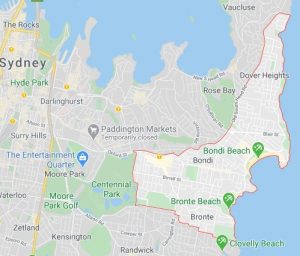
They can block drains and sometimes damage the sewer and stormwater pipes that take wastewater off your property.
Many homeowners hold Waverley Council responsible for their blockage and expect they will clear their blocked drains for free because they own the trees.
Well in some cases they do!
But, Waverley Council gets their income from you the ratepayer and as you would expect, they have guidelines for spending ratepayers money to fix your blocked drains.
If you have a Blocked drain and live in one of these suburbs managed by Waverley Council including Bondi, Bondi Beach, Bondi Junction, Bronte, Charing Cross, Clovelly, Dover Heights, North Bondi, Queens Park and Waverley, click here to see the Waverley Council Sewerage Stormwater Drain Blockage Policy.
The top points are that you the homeowner:
Must have a sewer service diagram for your building.
Must maintain your sewer pipes.
Must prevent sewer blockages.
Must prevent sewerage from escaping into the environment.
May be entitled to the Council plumber clearing your blocked drain.
Randwick Council trees are blocking my drains
Blocked drains are a large part of our workday; every day! And 85% of blocked drains are caused by tree roots. Our home is Coogee Randwick, in the eastern suburbs of Sydney Australia.
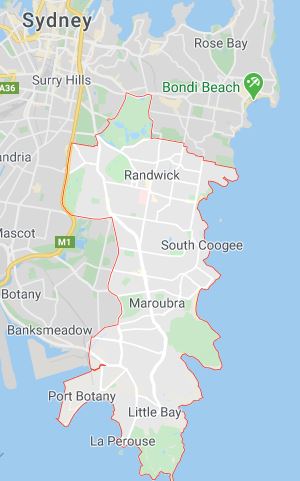
Tree-lined streets in Randwick Council are the reason for a lot of the blocked drains that we attend to. They damage the sewer drains and stormwater pipes that take wastewater off your property.
Many homeowners hold the council responsible for their blockage and have expectations that the council will clear their blocked drains for free because they own the trees.
Well in some cases they do.
But, Randwick Council gets their income from you the ratepayer and as you’d expect they have guidelines for spending ratepayers money to fix your blocked drains.
If you live in one of these Sydney suburbs managed by Randwick Council including Centennial Park, Chifley, Coogee, Kensington, Kingsford, Little Bay, Malabar, Maroubra, Matraville, Pagewood, Phillip Bay, Port Botany and Randwick, click here to see Randwick Council Sewerage Stormwater Drain Blockage Policy.
The top points are that you the homeowner:
- Must have a sewer service diagram for your home
- Must maintain your sewer pipes.
- Must prevent sewer blockages
- Must prevent sewerage from escaping into the environment
- Maybe entitled to the Council plumber clearing your blocked drain
Tree roots don’t know about Coronavirus
Sydney April 14th 2020
Easter is over for another year.
Although our towns are slowing because of the Coronavirus, and we are quickly changing our daily home and work habits, here at The Lone Drainer and Pronto, we are still working away.
Working from home is putting our normal facilities under a little more pressure. That means the internet, the exercise areas and our bathrooms.
With all that extra baking and comfort meals, our sewers are under a more significant workload. Tree roots don’t know about Coronavirus, and still seek food and water in the sewer pipes they can grow into.
So, if you hear your drains gurgling don’t ignore them. They are asking for help.
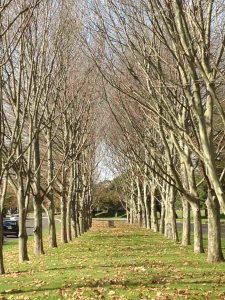
Dormant, but active underground
Who is responsible for my sewer pipes?
Did you know homeowners are responsible for their sewer pipes up to and including where they meet the Sydney Water sewer mains?
A lot of people are shocked when they find that out.
If you need to renew your sewer pipe line because it has been damaged by tree roots and the pipes run out in the middle the road, then, the homeowner is responsible for all the costs of the renewal, including Council road opening fees.

How do tree roots get into pipes? #2
In my last post I described how tree roots can easily travel through the soil that has been loosened by excavation for your pipe installation.
Do you know why tree roots grow in sewer pipes from the top of the pipe joints?
Condensation is formed when we run water from our water pipes, through our drains. Especially when we have a hot shower, and wash our clothes or dishes in hot or warm water. When the warm water enters the drains buried in the cold earth, condensation is formed, and it gathers on the inside top of our sewer pipes and drains.
The tree roots moving through our already loosened soils can now move along the top of the pipelines and are attracted to the warmth and moisture inside. All they need now is a way into the pipe.
This 1.58sec clip shows how.
How do tree roots get into pipes?
Tree roots grow through trenches dug for plumbing pipes.
When plumbers excavate a trench in virgin soil to lay our pipelines to take the waste water from your home, we till the soil.
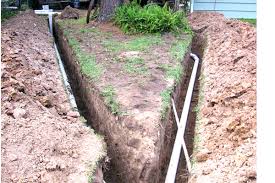
The simple method of excavating the soil with a shovel or even a mechanical excavator like a backhoe actually breaks up the soil.
See the tree in our attached pic?
Its root system will be able to grow through the trench looking for weakness in the pipe line.
After we complete our excavations and lay the pipes in the trenches, we back fill the trench, putting the excavated soils back.
Sometimes we water in the soil and quite often use a compactor to help with the back fill process.
Excavations are often back filled with an aggregate like blue metal gravel.
The back filled trench is never as compact as the virgin soil. It provides the roots of nearby trees a much easier path to “wander” along in their search for water and nutrients.
Do tree roots grow in PVC pipes?
Do tree roots grow in PVC pipe?
Yes they do!
The PVC pipe shown here in this Youtube clip has tree roots growing in through the wall of the pipe in three different places. There is a significant Norfolk pine tree and a Paperbark tree within two-three metres of the pipe.
The roots were cut from this pipeline about 8 weeks ago.
This survey was taken before applying Vaporooter to the pipe line.
Vaporooter will NOT fix a broken pipe. Vaporooter stops tree roots in drains!
In this case, we are only keeping the roots at bay until the necessary repairs are undertaken.
Emergency blocked drains affected by the full moon??
Blocked drains happen everyday in Sydney and all the plumbers on our team love getting out there to help people clear their blocked drain, clean up any mess from an overflowing sewer, and get on with their lives.
We track the most common cause of blocked drains and apart from the very unusual, like a small puppy as seen on a previous post http://thelonedrainerandpronto.com.au/blog/plumber-rescues-puppy/ there are only a few reasons why drains get blocked.
- Hair – make sure to remove it from hand basins, shower grates and drains.
- Sand and soil – usually gets washed into the sewer from low lying surcharge gullies and stormwater running down footpaths and driveways.
- Foreign objects – like dental floss, toilet deodorisers , kids toys or even underwear, will block up sewer pipes very quickly.
The most common cause of blocked drains in Australia is tree roots; they grow into the pipes for many different reasons. Today’s theory has been raised by a colleague who believes that the full moon causes trees to do “something different” every month, like search for more water, or just “flex their muscles”, thus causing more sewer blockages. It is a very interesting theory and we have been tracking it for about 18 months.
Every month, two or three days either side of the full moon we have a 10-15% spike in requests for help on blocked drains caused by tree roots. This month the full moon fell on July 26th 2010, and it was no exception. Of course this is only a theory, but we will keep tracking it!
If you see or hear of emergency plumbers and blocked drain specialists acting and looking a little weird around the full moon………….let me know!
Plumbing Products – Bio-Clean and Vaprooter
Plumbing Products Have Come a Long Way: A Look at Some Products and Their Benefits
Sir John Harrington, the godson of Queen Elizabeth I made a new invention for his godmother: Sir John created the flush toilet and built it for his godmother. This all took place in 1596, according to history records.
Alexander Cummings obtained the first patent for a flushing toilet in 1775. Toilets started gaining popularity, and a city wide sewer system was constructed to handle the flow of refuse. As science advanced, it was recognised that poor sanitation caused diseases and in 1880 the officials of the day decided that toilets and sewer systems were not luxuries but priorities to control human waste and disease.
Jumping to modern day plumbing, the innovations and possibilities are endless when you have plumbing services like The Lone Drainer and Pronto, experts in the field of plumbing with 40 years combined experience. Any type of renovation, plumbing emergency or plumbing need can be taken care of with just one phone call to The Lone Drainer and Pronto.
Sewer lines brought whole new problems to society that had not been faced before. Many old trees had roots that sometimes stretched for a block. These roots invaded the sewer lines because the roots are attracted to the plumbing pipes where they find a constant source of moisture. Today there is a product that eliminates this problem for you. Vaporooter is 100% safe and has been used successfully for more than 40 years. Paying for repairs is much more expensive than using Vaporooter to prevent the problem in the first place. Vaporooter stops tree root blockage from occurring.
Are you tired of having plumbing problems where roots have crushed, cracked or blocked your sewer pipes? It gets very expensive trying to keep up with repairs. So call The Lone Drainer and Pronto plumbing services and get insurance on your drains with Vaporooter.
Older homes with older pipes can produce a foul odour, but there is a way to solve that problem. The plumbing services of The Lone Drainer and Pronto have a product that will solve this problem for you faster than you could have ever imagined. You will no longer have to be embarrassed about the odour coming out of your pipes when you use Bio-Clean. This environmentally friendly bacteria waste eliminator will get your pipes spotless and odour free. What a relief it will be to walk into your home and smell the cut flowers instead of sour old pipes!
Bio-Clean performs several functions such as cleaning out the hair in the drains and pipes, and dissolves paper and cotton without using toxic chemicals. This environmentally green solution to an ageless problem is safe, will clear most of the obstruction in the drains and pipes and will not damage your pipes and/or fittings. Bio-clean is friendly to your plumbing pipes and drains.
Just what is your peace of mind worth when the plumbing goes on the blink and the missus is upset because your drains are blocked? Call The Lone Drainer and Pronto, and keep the peace in your household with Vaporooter and Bio-Clean.
How do Tree Roots Get in Sewer Pipes And what Damage Can They Cause?
Homes that are connected to a municipal or mains sewer system have their biggest plumbing problems when tree roots have grown into pipes. In days gone by, one of the plumbing services would be called in to clear a blockage in the pipe, getting rid of those tree roots, but the tree roots would regrow and block up the sewer up again.
Regrowth of tree roots and the aggressive action of repeat cleaning earthenware or clay pipes with an electric eel or other drain cleaning equipment, is destructive to the integrity of the pipes. The pipes split, crack and crumble after the roots repeatedly find their way into the pipes. The pipe then has to be replaced at the home owner’s expense.
Tree roots are going to head for the easiest source of water they can find. A sewer pipe is the perfect environment; there is warmth, a constant stream of water and nutrients from degraded food matter. This is the perfect environment for those tree roots to take over your sewer system because the nutrient leakage through these pipes makes it even more inviting for the tree roots, and they just keep coming.
So the cycle continues!
Several things can be done to prevent root intrusion into the sewage system.
Liquid ambar, camphor laurel, ficus (fig) and London Plane trees are the worst offenders when it comes to sending roots to a convenient water source. Do not plant these varieties close to your sewage system.
Calling plumber services Sydney to make sure that you can identify where the roots are, where the crack in the pipes is, and how to finally get rid of your root problem, can be costly. It is a good idea to find a plumber that uses a sewer pipe camera in order to identify exactly where the problem is.
There is a chemical treatment that can kill the tree roots invading the pipes without killing the trees; by using an experienced plumber in Sydney that can provide this plumbing service to get rid of those tree roots, you can save yourself costly repair bills.
The best way to avoid tree roots in your sewer pipes is to remove any young trees that are trying to grow near or above the sewer pipe lines. Call in a professional from one of the reputable plumbing services and make sure that when you do engage that plumber, they do all the diagnostics necessary to identify exactly where the problem is before they set about repairing busted pipes and removing those tree roots that will continue to invade the pipe system.
Eradicating tree root problems
Tree roots are a very common cause for blocked drains, however the extent of damage that tree roots can cause before a problem is recognised, can vary greatly. To get rid of a tree root problem you must know what condition of the pipes are.
The Lone Drainer and Pronto has a number of weapons in its arsenal to combat those all-invasive tree roots; but in order to decide on the correct solution for the situation at hand, it is good practice to know what is happening with the drain. In many cases we insist on the use a special drain camera to view the location of the blockage and the condition of the connecting pipes.
The drain cameras we use are an enormous cost saver and allow us to determine the condition of underground pipes. Our pipe locating equipment shows us where to dig, minimising the need for large excavations to locate them. This reduces the guesswork and helps us make informed decisions on how to treat your particular blocked drain. In 2009 it makes great sense to use the technology available to us; it helps us help you!
https://www.thelonedrainerandpronto.com.au/plumbing_services.php
Vaporooter Guarantee
Blocked drains are a major problem – any way you look at it!
Tree root invasion of sewer lines is a common cause of such blockages — BUT, when left unattended, tree roots will cause major damage to your sewer pipes (which, as you might imagine, can be far more troublesome than just any old blockage, not to mention the resulting sewerage backflow).
Replacing broken or collapsed sewer pipes can be a VERY expensive exercise…
Thankfully, there is a solution!
The best solution available is Sanafoam Vaporooter. When applied to sewer lines correctly, the foam coats the interior of the affected pipes, seeping through any fine cracks which may have been created by the invading tree roots, and killing off any roots it comes into contact with. Vaporooter is so effective, that we guarantee the results for 12 months…
Vaporooter: The BEST solution for tree roots in sewers!
https://www.thelonedrainerandpronto.com.au/vaporooter.php
